2000-2021
Polish Cultural Institute New York
60 E 42nd St Ste 3000
New York, NY 10165
Looking back at the last 20+1 years of our work, we celebrate our 21st anniversary with you by sharing selected projects done in the past 21 years. Explore more current and recent Film & Performing Arts Projects.
Explore further highlights of the 20+1 years of our work:
→ Music
→ Humanities
→ Visual Arts & Design
→ Film & Performing Arts
→ Polish-Jewish Programming
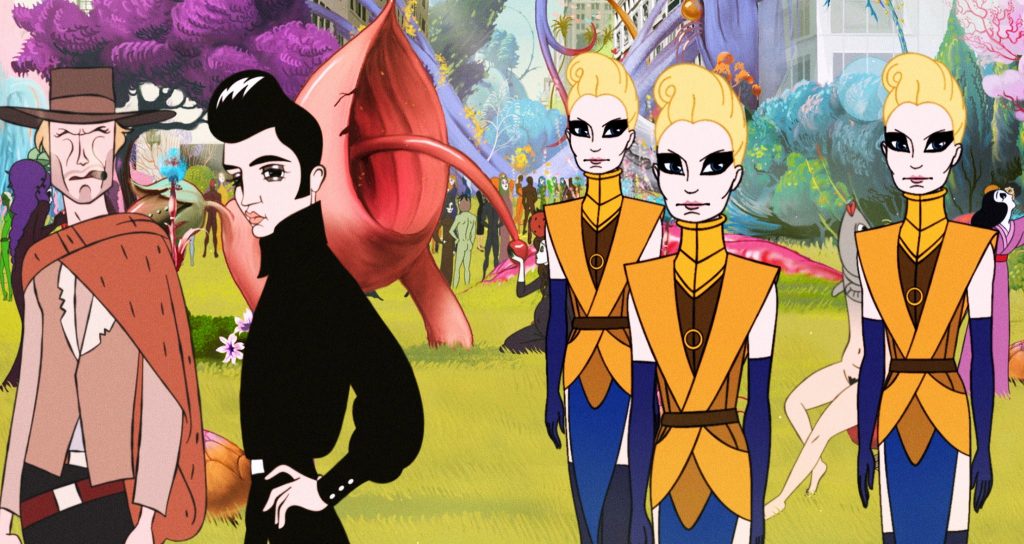
Stanisław Lem Centennial on MUBI (2021-2022)
The Polish Cultural Institute New York has partnered with MUBI to celebrate Stanislaw Lem’s centennial with a series of films available online. Our audiences can watch the series with a 30 days free trial (instead of the regular 7 days) by clicking this link: MUBI. Legendary Polish sci-fi author Stanisław Lem is best known for his visionary, genre-changing Solaris, famously adapted by Andrei Tarkovsky for his masterpiece of the same name. Marking his centennial, we’re looking back at six key Lem adaptations–by Ari Folman (The Congress), Andrzej Wajda (Roly Poly), Marek Piestrak (Pilot Pirx’s Inquest), Edward Zebrowski (Hospital of the Transfiguration), György Pálfi (His Master’s Voice), and Stephen Quay & Timothy Quay (Maska). Read more about Stanisław Lem in the essay by Ela Bittencourt.
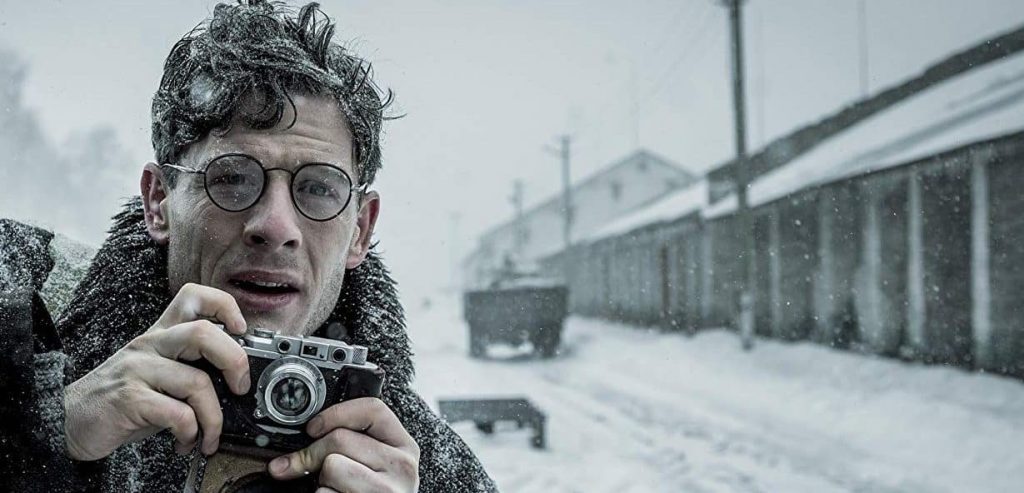
BAM Kino Polska (bi-yearly)
Bi-yearly, Brooklyn Academy of Music (BAM) in partnership with the Polish Cultural Institute New York presents Kino Polska: New Polish Cinema, bringing together the best new works from Poland’s boundary-pushing filmmakers. In 2021 the series featured seven films, including the New York premiere of the Venice Film Festival hit Never Gonna Snow Again (2020). Director Malgorzata Szumowska (whose Berlinale prizewinner Mug screened in the 2018 iteration of Kino Polska) partners with longtime cinematographer and co-writer Michal Englert’s for this Venice Film Festival hit about an enigmatic healer who casts a spell over a rich Polish community (“Stranger Things” actor Alec Utgoff in the lead role). 2021’s series also included Mariko Bobrik’s touching debut feature The Taste of Pho (2019) about a Vietnamese father and daughter dealing with grief and the immigrant experience in Warsaw; the bittersweet coming-of-age drama I Never Cry (2020) from Piotr Domalewski whose previous film Silent Night won major awards in Poland; Bartosz Kruhlik’s edge-of-your-seat thriller Supernova (2019); Piotr Adamski’s Eastern (2019), a tale of revenge set in a dystopic Poland; Mariusz Wilczynski’s unconventional and deeply personal hand-drawn animated film Kill It and Leave This Town (2020); and Agnieszka Holland’s Soviet Union thriller Mr. Jones (2019) starring James Norton, Vanessa Kirby, and Peter Sarsgaard. The series is co-organized by Polish Cultural Institute New York and co-programmed by Tomek Smolarski.
“Poland’s entry for the 2021 Academy Awards, “Never Gonna Snow Again,” didn’t land a nomination after falling on the shortlist, but it still casts a powerful spell. Director Małgorzata Szumowska teams with her longtime cinematographer and co-writer Michał Englert for this mysterious drama that balances beguiling whimsy with droll laughs in weaving a kind of fairytale spin on Pier Paolo Pasolini’s “Teorema.””—Ryan Lattanzio
Selected Press:
IndieWire: ‘Never Gonna Snow Again’ Trailer: An Enigmatic Healer Casts a Spell in This Polish Fairytale
MovieJawn: EASTERN is a curious and engaging genre riff
Slant: Papusza at BAM’s Kino Polska: New Polish Cinema
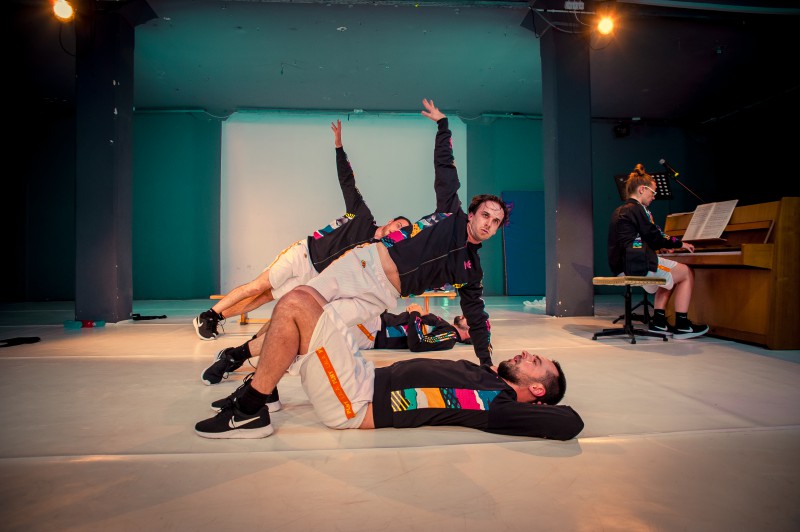
Cezary Goes to War (2020)
In 2020, La MaMa ETC in association with the Polish Cultural Institute New York and Komuna Warszawa presented the US premiere of CEZARY GOES TO WAR. Conceived and directed by Cezary Tomaszewski, a rising star of the Eastern European avant-garde, Cezary Goes to War draws on Tomaszewski’s personal experiences with Poland’s military draft and its archaic system of male classification. Weaving text from military evaluations of manliness, choreography inspired by army drills, and the patriotic songs by Stanislaw Moniuszko, the father of Polish national opera, Cezary Goes to War offers a witty critique of military recruitment and the vulnerability of male identity. Using elements of music by Moniuszko and Schostakovich, as well as Nijinsky’s ballet Afternoon of a Faun, the director engages the audience in a series of subversive identity games that turn the military ethos on its head.
„This hour-long Polish production is something special: funny yet poignant and smart in its layering of style and content. (…) In short, Cezary is a treat.” Donald Hutera – The Times
„Cezary Goes to War is an idiosyncratic piece bursting with originality and verve.”– Richard Beck, Broadway Baby
Selected Press:
The Times: Edinburgh theatre review: Cezary Goes to War at Army@TheFringe, Summerhall
Broadway Baby: Cezary Goes to War
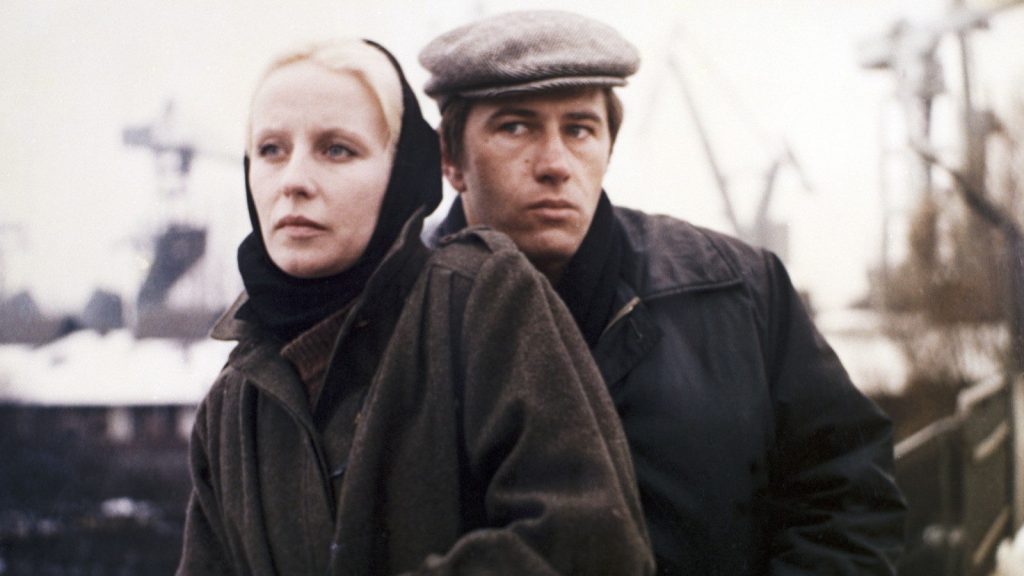
Tribute to Andrzej Wajda (2017)
Andrzej Wajda passed away on October 9, 2016 in Warsaw at the age of 90, nearly a month after the world premiere of his last film, Afterimage. For more than half a century, Wajda crafted a filmography that encapsulated the essence of postwar Poland and constitutes, quite simply, one of the great legacies of world cinema. No single visual style or strategy characterizes his films. His work often employed intricately illuminated deep spaces as well as looser, more vérité methods; many served as counter-narratives to the officially sanctioned records kept by Stalinized Poland; others were more oblique and meditative as they reckoned with concepts including individualism, one’s duty toward others, and the meaning of freedom. This February, the Film Society is honored to present a selection of the Polish master’s previous films in celebration of his monumental life’s work, as well as the New York premiere of Afterimage, an impassioned memorial to the great avant-garde artist Władysław Strzemiński. Presented with and at Film at Lincoln Center. Organized by Florence Almozini and Dan Sullivan.
“Tallying up the lifework of Polish demiurge Andrzej Wajda can be like taking on history itself — a national history made up of movies. Having at last given up the ghost this past October, at 90, Wajda, who made his first short when he was 24, left behind a career that ran for a ridiculous 66 years, from 1950 to right now: His last film, Afterimage (2016), follows this Lincoln Center salute with a proper release in May. The New Wave generation is almost gone, and with it a direct line to the idea that movies could and should matter, that they can change lives. Wajda never made a movie for the hell of it — every film on his huge shelf burns with necessity.”—Michael Arkinson, The Village Voice
Selected Press:
IndieWire: Andrzej Wajda Tribute at the Film Society of Lincoln Center
WorldFilmGeek: A Tribute to Andrzej Wajda (1926-2016)
The New York Transatlantic: A Tribute to Andrzej Wajda
The Village Voice: A Tribute to Andrzej Wajda: Diamonds in the Ashes
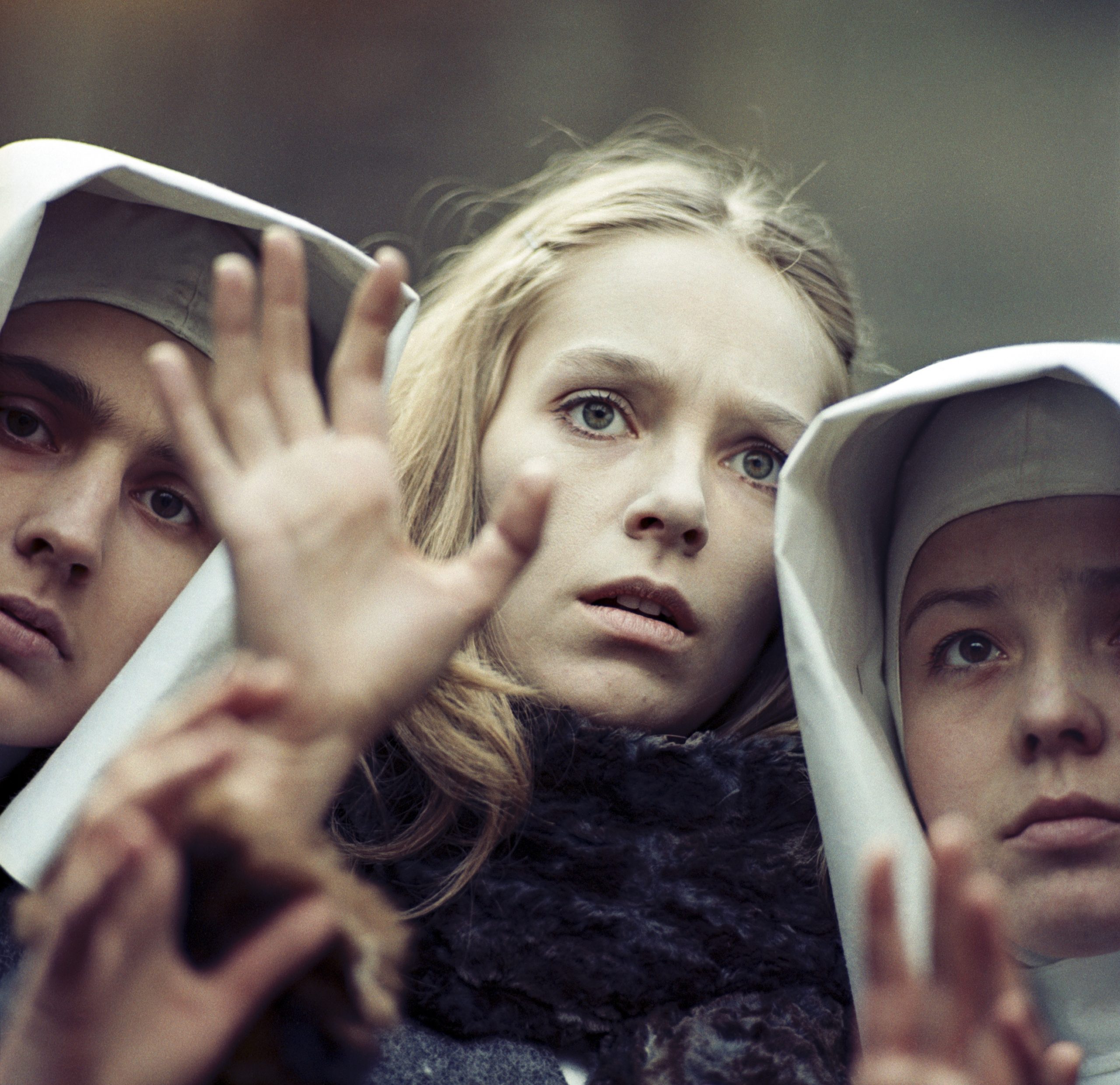
BAM: Żuławski Retrospective (2012)
In 2012, the Polish Cultural Institute New York, BAMcinématek in New York and the Cinefamily in Los Angeles joined forces to present the first complete US retrospective of Andrzej Zulawski‘s films. Long overdue, this unique program featured all Polish and French films by the acclaimed European auteur, including the new 35mm print of the controversial erotic-political thriller Possession (1981), starring Isabelle Adjani (Best Actress at the Cannes Film Festival) and Sam Neill; That Most Important Thing: Love (1975) with Romy Schneider and Klaus Kinski, and the debut screening of a newly struck 35mm print of The Third Part of the Night (1971).
“The word to best describe the Zulawski oeuvre might be “awful” in its root sense of inspiring dread. Exuding charm and urbanity on the phone, Mr. Zulawski is nonetheless an auteur to be approached with trepidation. His movies are seldom more than a step from some flaming abyss, with his actors (and audience) trembling on the edge. Typically shot with a frenzied, often subjective moving camera in saturated colors that have the over-bright feel of a chemically induced hallucination, these can be hard to watch and harder to forget.”—James Lewis Hoberman, The New York Times
Selected Press:
The New York Times: Food, Politics and Sex, Brought to a Boil
The Wall Street Journal: Repertory Film: Zooming in and Zoning Out

A Couple of Poor Polish-Speaking Romanians (2011)
In 2011, the Polish Cultural Institute in New York and East River Commedia presented A Couple of Poor Polish-Speaking Romanians by Dorota Maslowska (directed by Paul Bargetto, traslated from Polish by Benjamin Paloff). “It is a short play, filled with humor and a whole lot of gags. Two really nice protagonists, acting on mysterious impulses, set off on an unintentionally frantic quest through Poland. It is a quest full of comic adventures, which over time turn out to be no joke, quite the opposite in fact, utterly no joke, indeed, quite tragic. The audience has to consider the fact that the play is not as lighthearted as it seems; its characters do not represent positive social or psychological models, and this journey doesn’t have to be a life quest at all. Quite the contrary.”– Dorota Maslowska on A Couple of Poor Polish-Speaking Romanians
“Dorota Maslowska is the unchallenged queen of the young Polish literary scene.”– Frankfurter Rundschau
Selected Press:
The New York Times: In Poland, at Mercy of Weirdos
Brooklyn Rail: LAUGH TIL YOU DON’T: Dorota Maslowska’s A Couple of Poor, Polish-Speaking Romanians
Broadway World: Polish Cultural Institute Presents A COUPLE OF POOR, POLISH-SPEAKING ROMANIANS
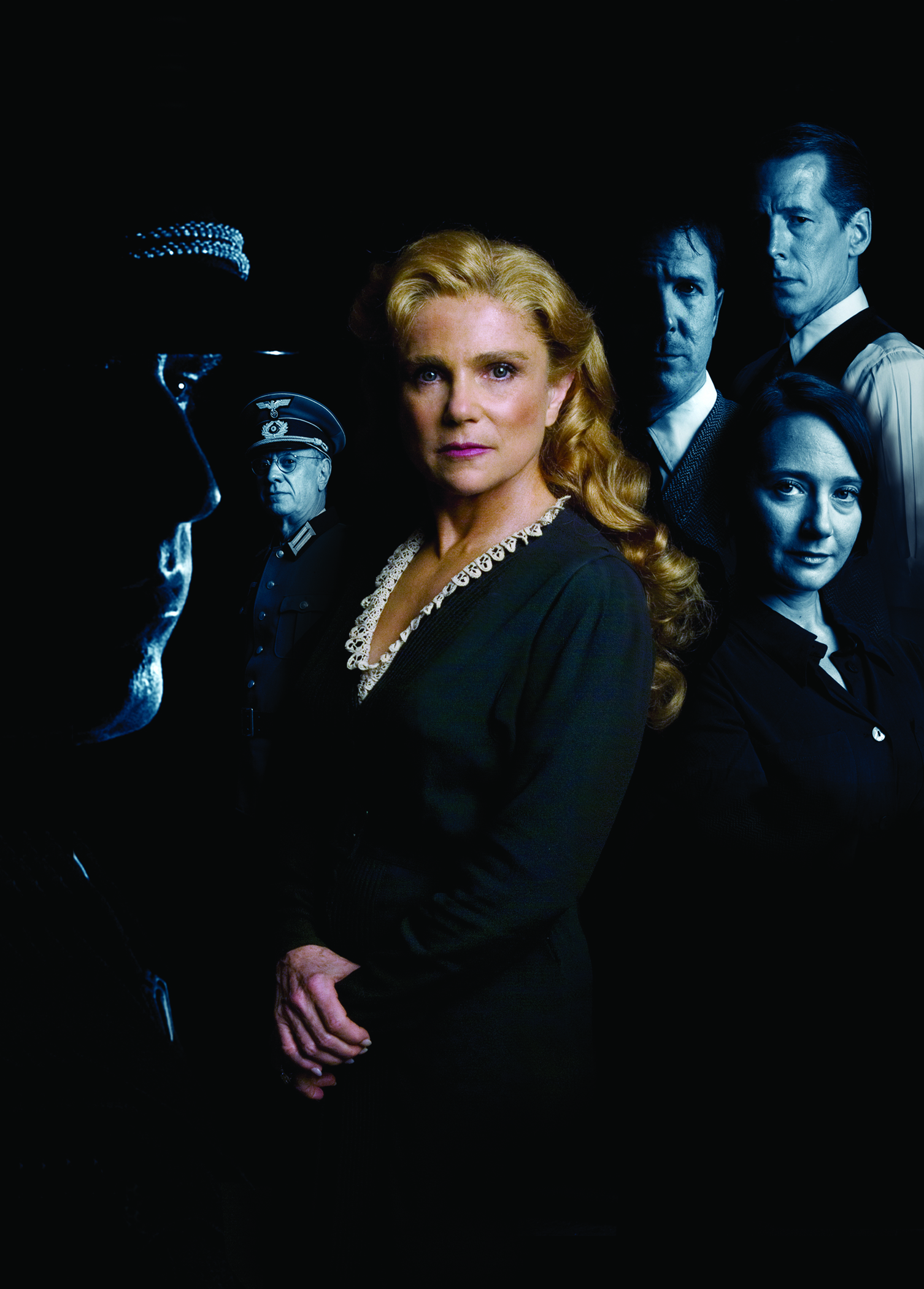
Irena’s Vow (2009)
In 2009, together with the Theater Company we presented IRENA’S VOW, the true story of an unsung heroine by Dan Gordon, directed by Michael Parva. Following a triumphant sold-out engagement off-Broadway, The Directors Company production of Irena’s Vow, the new play by Dan Gordon, starring four-time Tony nominee, and three-time Drama Desk Award-winner Tovah Feldshuh, and directed by Michael Parva, moves to Broadway.
Featuring a cast of ten, Irena’s Vow is the riveting, life-affirming story about one of the most courageous and unsung heroines of World War II. During the German occupation of Poland, Irena Gut, a young Polish Catholic, was forced to work as head housekeeper for a prominent German SS officer. Over a two-year period of service, Irena would risk her own life in order to protect the lives of twelve Jews whom she secretly took under her care. Irena’s Vow is the extraordinary true story of one woman’s choice and the twelve lives that would ultimately be saved – or lost – by her decision.
A great story. An important work. Tovah Feldshuh is exhilarating and remarkable.—Variety
Few of the heroes of World War II were more courageous than those who risked their lives to protect potential victims of Nazi genocide.—The New York Times
[My mother’s] main mission was to tell people that even one person can make a difference, and that people should never give up.—Jeannie Opdyke Smith, Daily News
Selected Press:
The New York Times: In Grave Times, Exemplary Courage
The New York Times: Hiding Innocents and Keeping Evil at Bay
Forward: Tovah Feldshuh Shines on Broadway
The Wall Street Journal: Are Misbehavin’: No Tonys for These Performances

Hell Meets Henry Halfway (2009)
In 2009, Wolly Mammoth Theatre Company with the generous support of the Polish Cultural Institute presented HELL MEETS HENRY HALFWAY at Pig Iron Theatre. Pig Iron Theatre Company’s Hell Meets Henry Halfway won a Village Voice Special Citation OBIE in 2005, after appearing in New York in the Polish Cultural Institute’s 2004 Gombrowicz Autumn Festival. In this extraordinary work, Philadelphia’s favorite dance-clown-theater ensemble turns a sharp eye toward Eastern Europe – specifically to the writing of Witold Gombrowicz, Polish absurdist and bad-boy of the literary establishment. Gombrowicz’s serial gothic thriller, The Possessed, or The Secret of Myslotch: A Gothic Novel is a tale of horror that features a haunted castle, a mad prince, and an otherworldly attraction between a tennis player and her coach.
“Hitler was on the verge of marching into Poland in 1939 when Polish bad-boy Witold Gombrowicz published “Possessed,” a gothic horror novel that was the “Night of the Living Dead” of its time. One can only speculate on what Adriano Shaplin saw coming over the horizon to inspire his hellishly funny adaptation of Gombrowicz’s absurdist nightmare — something bad for civilization as we know it, no doubt, but good news for nihilists.”—Marilyn Stasio, Variety
Selected Press:
Variety: Hell Meets Henry Halfway
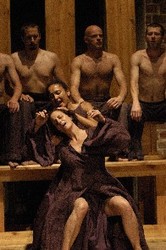
Chronicles – A Lamentation (2004)
In 2004, La MaMa E.T.C. in association with the Polish Cultural Institute presented: Song of the Goat Theater CHRONICLES – A LAMENTATION, which evolved through the group’s two years of research into the varied traditions of lamentation, and is based in particular on the polyphonic lamentations they found in Albania, particularly along the Greek border. As they describe it, “These lamentations were sung during both funerals and weddings, during all kinds of events – everything was a lamentation. Moreover, these laments contained a very interesting division of voices. The names of these different voices opened up a surprising space for our theatre work. They were called: the voice that weaves (or perches), the voice that cuts, the voice that takes, and the drone (the voice that gives). For us, there was an immediate association with the structure of Greek tragedy. Is it possible that a tradition has survived which was itself the inspiration for Greek tragedy? This was our question.” And then: “During our search for lamentation we touched on something which could be called the “physiology” of singing. If we assume that one of the functions of lament is to cleanse through weeping, it seems that lamentations are an extraordinarily cleansing tool.”
“Dense, beautiful and brief, “Chronicles: A Lamentation,” a performance piece from Poland-based theater company Song of the Goat, proves that sounds of sadness can be heartening.”—Steven Oxman, Variety
Selected Press:
Variety: Chronicles: A Lamentation
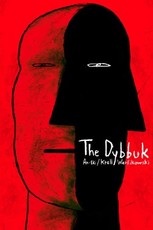
The Dybbuk (2004)
In 2004, “Next Wave” Festival at BAM presented TR Warszawa’s THE DYBBUK (in Polish with English surtitles) directed by Krzysztof Warlikowski. After much anticipation, the internationally acclaimed Polish director made his US debut as part of BAM’s 2004 Next Wave Festival – with his haunting adaptation of Yiddish writer and socialist Szymon Anski’s famous novella The Dybbuk, interwoven with several other Yiddish tales and a compelling short story of the same title by contemporary Polish-Jewish novelist Hanna Krall.
“The Next Wave Festival at the Brooklyn Academy of Music is obliging with “The Dybbuk,” an intense, somewhat exhausting work that explores a disquieting piece of Jewish folklore with striking stage pictures and an even more striking soundscape./The Polish director Krzysztof Warlikowski, making his American debut, merges two tales of dybbuks — souls whose earthly lives end prematurely and who come back and inhabit a living body — into an intermissionless two-and-a-half hours that is heavy on mystical-sounding phrases.”—Neil Genzlinger, The New York Times
Selected Press:
The New York Times: Two Tales of Dybbuks as an Allegory for Poland and Judaism
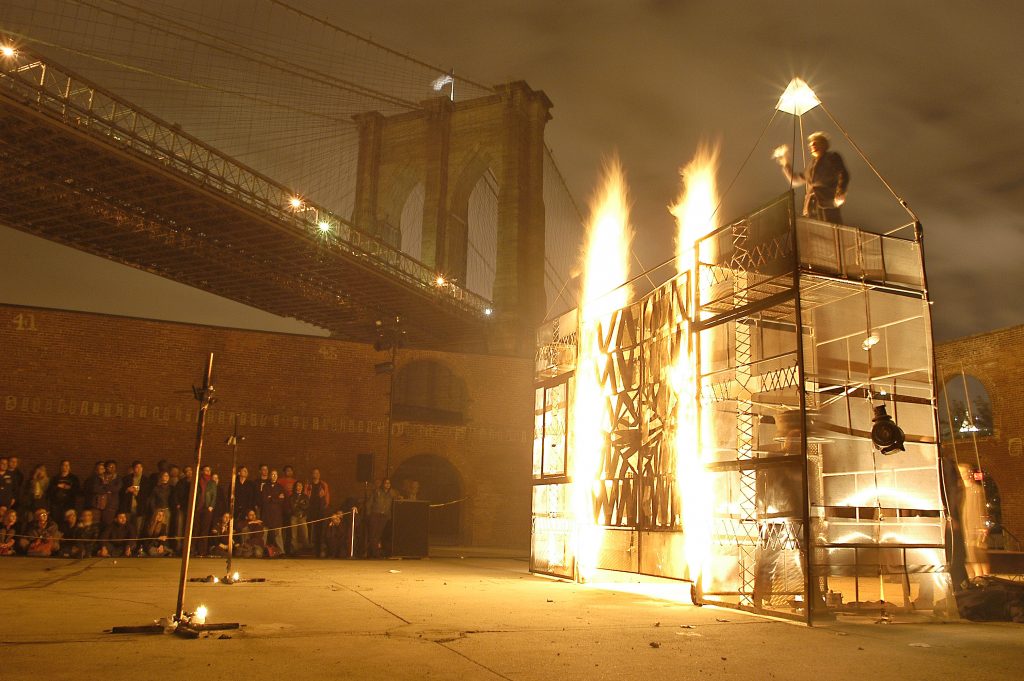
Teatr Biuro Podróży: Carmen Funebre (2003)
In 2003, The Polish Cultural Institute, in association with David Eden Productions presented TEATR BIURO PODROZY in their internationally acclaimed outdoor physical theatre performance. The theatre performance traveled to Chicago, Minneapolis, Phoenix, New York.
From Poland, acknowledged home of some of the world’s greatest theatrical innovation, and from one of its preeminent avant-garde theatrical companies – Teatr Biuro Podrozy (The Travel Bureau) – comes what is perhaps the most internationally celebrated single theatrical performance in the history of Polish theater. Carmen Funebre (Funeral Song) comes to New York City for the finale of its first major U.S. tour following its overwhelming impact last year on critics and sell-out audiences alike in Philadelphia. This monumental work of outdoor, night-time physical theater, performed in Brooklyn’s large but roofless old Tobacco Warehouse in DUMBO, a perfect venue, incorporates towers of fire, sinister masked actors on giant stilts, searchlights, and chilling music to evoke metaphorically the terrors of armed conflict and ethnic hatred, while managing to elicit both fear and compassion. As the performance derives from Poland’s highly developed tradition of the visual theater of movement, it is virtually wordless and thus accessible to all. Carmen Funebre’s creation by Teatr Biuro Podrozy was originally inspired and informed by eyewitness accounts of the war in Bosnia and other ethnic conflicts. It has been performed in close to forty countries on five continents.
“Beautiful, and quite unmissable” – The Independent
“Unforgettable” – The Observer
“Electrifying” – The Guardian
“A masterpiece” – The Scotsman
***
THE POLISH CULTURAL INSTITUTE NEW YORK was founded in 2000. It is a diplomatic mission of the Ministry of Foreign Affairs of the Republic of Poland, operating in the area of public diplomacy. The PCI is one of 24 such institutes around the world. It is also an active member of the network of the European Union National Institutes for Culture (EUNIC) in its New York cluster.
Explore the highlights of the 20+1 years of our work:
→ Music
→ Humanities
→ Visual Arts & Design
→ Film & Performing Arts
→ Polish-Jewish Programming
The Institute’s mission is to share Polish heritage and contemporary art with American audiences, and to promote Poland’s contributions to the success of world culture. The Institute does so through initiating, supporting and promoting collaboration between Poland and the United States in the areas of visual art, design, film, theater, dance, literature, music, and in many other aspects of intellectual and social life. The Institute’s main task to ensure Polish participation in the programming of America’s most important cultural institutions as well as in large international initiatives.
The Polish Cultural Institute New York works with renowned cultural and academic centers and opinion leaders operating on the American market. Its main partners include such prestigious organizations as Lincoln Center for the Performing Arts, the Brooklyn Academy of Music, the Museum of Modern Art, PEN American Center, the Poetry Society of America, the National Gallery of Art, Yale University, Columbia University, Princeton University, the Harvard Film Archive, the CUNY Graduate Center, the Julliard School of Music, the New Museum, the Jewish Museum, La MaMa E.T.C. and many others. For more than fifteen years, it has presented Americans the achievements of outstanding Polish artists, including the filmmakers Andrzej Wajda and Jerzy Skolimowski; the writers Czeslaw Milosz, Adam Zagajewski and Wislawa Szymborska; the composers Krzysztof Penderecki, Witold Lutoslawski and Mikolaj Gorecki; theater artists Krystian Lupa, Jerzy Grotowski and Tadeusz Kantor; the visual artists Krzysztof Wodiczko, Katarzyna Kozyra, Alina Szapocznikow and many other important figures in the arts. The Institute initiates and actively participates in debates around the humanities in the broad sense, including those concerning history and the today’s most important social and political occurrences.



